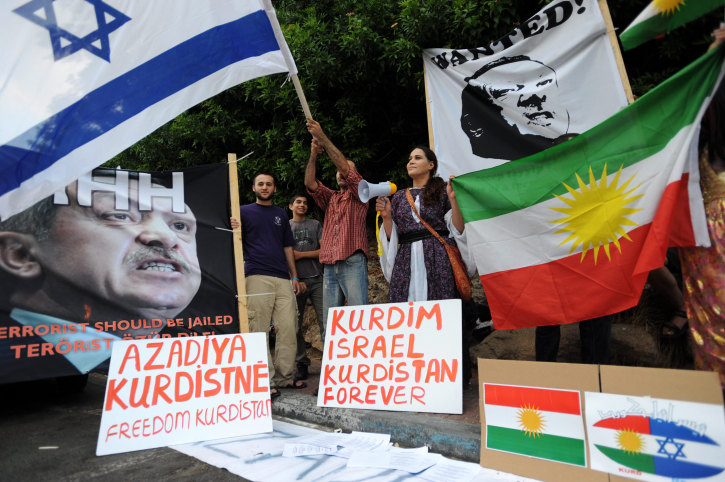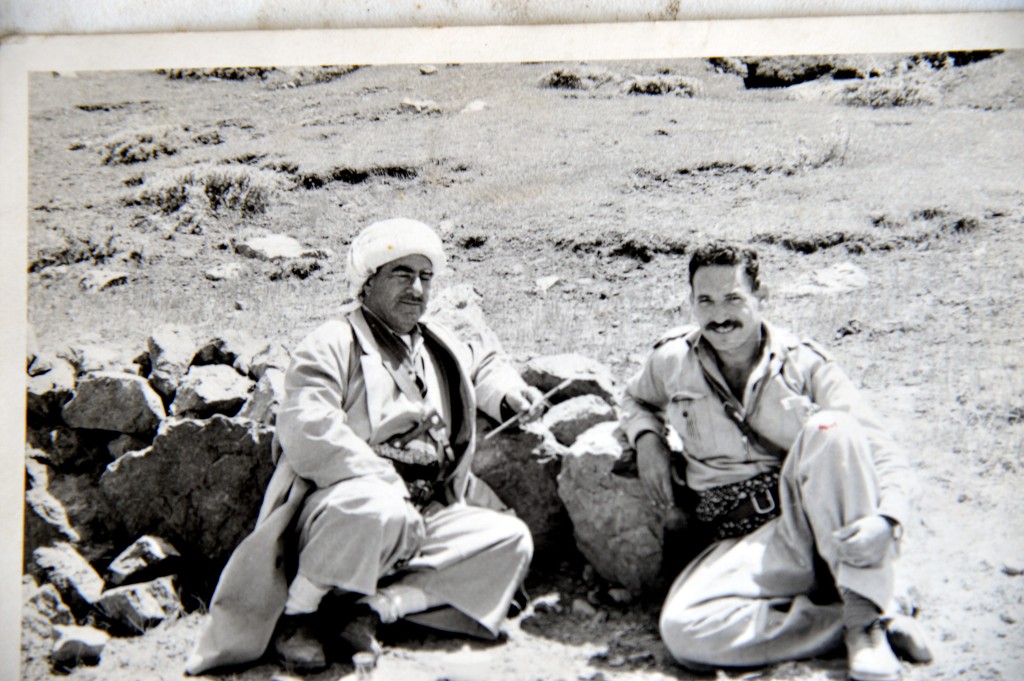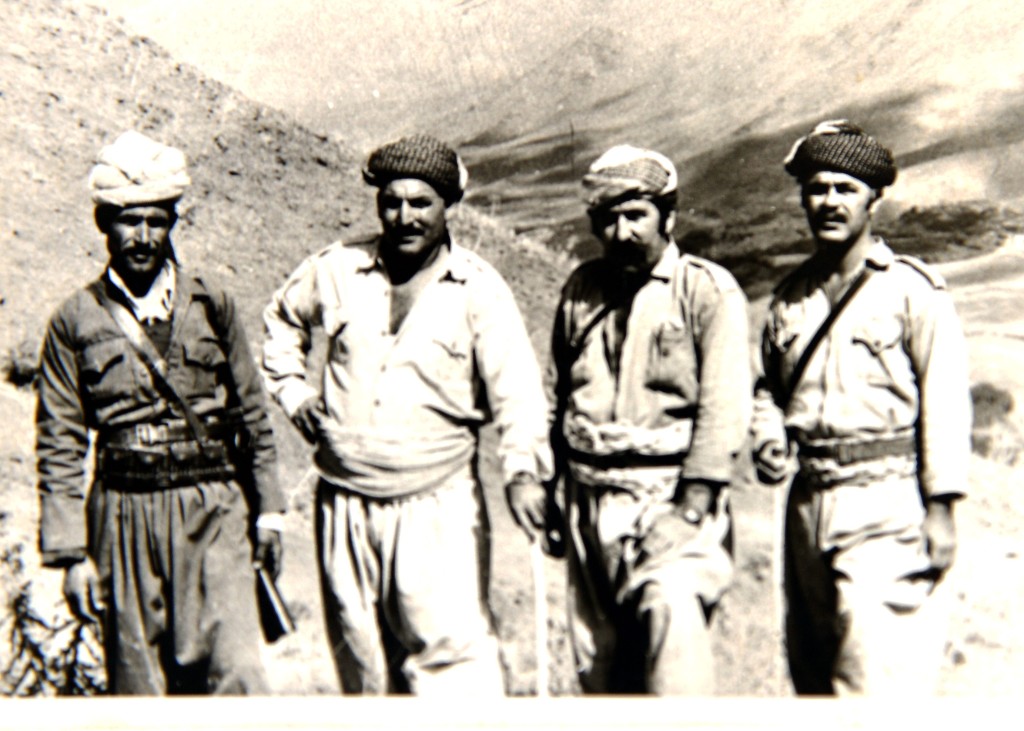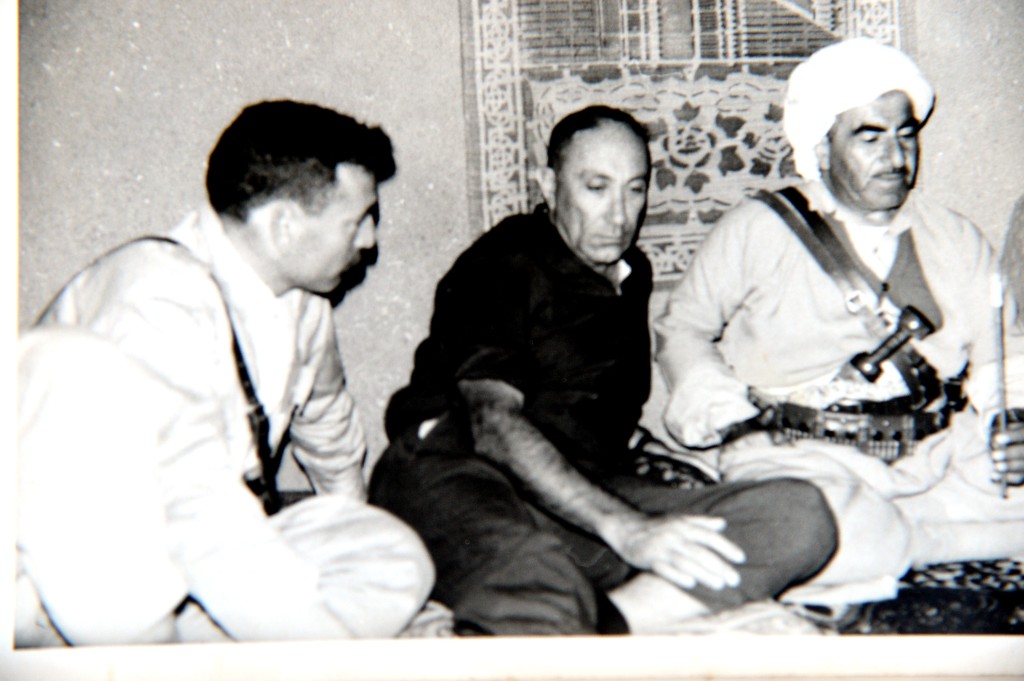The fascinating story of a key figure in the decades-old friendship between Israel and the Kurds, Brig. Gen. Tzuri Sagi.
The Kurds and Kurdish-speaking Yezidis are once again caught in the grip of the Sunni-Shia vice · Against this background and often isolated, their special relationship with Israel stands out for the good: military advice, equipment and training are only some of the ways Israel has helped the Kurdish struggle for independence · “They only have trust in Israel,” says Brigadier General (res.) Tzuri Sagi, the man who led the Kurds to their stunning victories against Iraq in the sixties and seventies

A little while ago, an Israeli called his car repair shop in the village of Tira. The word Kurdi was part of the shop owner’s name. The man on the other end answered in English. Only then did the Israeli realize he’d accidentally called the office of Massud Barazani, President of Kurdistan, in Irbil.
This incident is an amusing sign of a long history of positive ties between Israel and the Kurds. The intimate friendship began in 1965, and to this day serves as a model for the convergence of interests and shifting alliances in the Middle East between Iran, Iraq and other players in the region.
The man who more or less built the Kurdish army and led it in two wars against the Iraqi army is Brigadier General (res.) Tzuri Sagi. Today from his home in Ramat-Hen in the aptly named Tzanhanim (Paratroopers’) Neighborhood, he is seeing the region he knows so well being torn apart by genocidal ISIS members rampaging around in their trucks. Even harder to endure is the Kurds’ apparent inability to stop them.
“What’s happening now is a war of Shiites against Sunnis – with the Shiite axis lead by Iran and the Sunni axis led by Turkey, and I wish both sides much success,” Tzuri told me as we sat next to the old kitchen table in his house. “But within all that, we need to help the Kurds. Turkey wants the oil in Western Iraq. If the Kurds lose control of the sources of oil in their possession, their situation will become very difficult. I would even help the Kurds from the air. It could be good practice for the air force. Instead of destroying terror targets in Gaza, which I don’t know what that means – attack ISIS targets. I don’t know what this ISIS is; I know it has remnants of Saddam’s army and they’re disconnected from the Sunnis in Iran.”
The weakness the Kurds are showing is surprising. In Sagi’s opinion, ISIS went after the [Kurdish-speaking] Yezidis because they’re the weakest group and this is the way of people in the region – to attack the weak. “The Kurds apparently became wealthy and more bourgeois and didn’t understand what they’re facing fast enough.” [A point confirmed in a recent analysis by military historian Kenneth Pollack – A.W.]
But to truly understand the present conflict being fought in northern Iraq, where the Yezidis are fighting for their lives against murder and starvation just like the Armenians a century ago, Sagi wants to go back to 1965-66. A landmark year for the Kurds, perhaps as much as the following year was for Israel.
At the time, Sagi had left his position as commander of the fabled 890th Paratroop Battalion and was sent to Iran. “Big things are done by big people,” Tzuri said, “if there’s a man who’s big enough and crazy enough who also goes against the establishment, then it works. I went into this game as an army officer.” “This game” is almost like a movie: a breathtaking geopolitical maneuver, with a then lieutenant colonel in the IDF with a mustache who successfully blends into the mountainous region of northern Iraq, as well as connections and initiatives which cut through the red tape like a machete through cobwebs.

From Reprisal Raids to the Hills of Khuzestan
First, the background of the Great Middle Eastern game: “the DNA of many conflicts is the fact that Iranian oil is located in an area settled by Sunni Muslims known as Khuzestan. Nasser declared back in the day that Khuzestan needs to be liberated from the Persian yoke. This gave us an opening to connect with the Iranians. There were then, in the mid-1960s, good statesmen, and the connection was made. The goal was to work against the then-nationalist Arab world. The Russians established, with the help of Nasser, the Egypt-Syria-Iraq alliance to combat CENTO (the Central Treaty Organization) established by the Americans. The three countries were filled with Russian tanks. In the background, an American embargo on Israel [of direct weapons sales – A.W.]. As a result, an alliance was formed between us and the Iranians and cooperation with the Turks.
“As part of the DNA of the conflicts in the area, we had an interest in the Kurdish rebellion. In addition, we had a score to settle with the Iraqi army.” Tzuri refers here to one of the failures of the 1948 War of Independence, when Iraqi units reached the areas of Kfar Kassem and Umm al-Fahm at the end of the war. Israel also did not forget the stinging defeat the Iraqi 4th brigade inflicted on the Carmeli brigade during the Battle of Jenin during that same war.
As a result of the alliance system, Tzuri says, we wanted to help the Iranians and the Kurds. “The Iranians also had issues with the Iraqis. It was important for them that the Iraqi army be far away from Khuzestan. I prepared the defensive plan for Khuzestan for the Iranians. For this, I prepared a course for special forces, so that they could cross the Iraqi border and operate them. This I only learned afterwards.
“Later I had to train the commanders of the Kurdish rebellion. So I told the Iranian commanders: why all the hassle. They were supposed to work themselves with the Kurds. Bring the Kurdish commanders to me. I was a veteran of reprisal raids, special operations. That was my background and I had good instructors with me, including one who sent the lethal packages to the German scientists [working in Egypt on missile programs among others – A.W.].
“I said, if the Kurdish commanders are here by me, we’ll learn from them what’s going on.” And the picture was bleak – like discovering that two divisions of ISIS suddenly showed up in the Jordan Valley overnight. “It was winter. It turned out the Iraqi army was concentrating six infantry brigades in the Gali Ali Beg area. It’s a channel, almost a valley within the mountainous block. They were waiting for the snow to melt so they could drive Mullah Mustafa Barzani and his men from the area.
“When I saw this I said: six brigades are waiting in the middle of the mountain region and I’m here dealing with special ops and commando raids. We need to prepare a conventional defensive battle. They brought me maps, I did a situational assessment, and I prepared a defensive plan appropriate for the Kurds, with fighting methods which matched both their character and their fighting capabilities. [But] There was no Kurdish Army that could just receive orders and act according to the plan.”
Tzuri Sagi has gone down in history as the man who built the Kurdish army, and for good reason. “I built a sand table and I assigned missions to the commanders, and during the course I taught the defensive plan to them. But after they learned the mission, commanders came to me and said: but I don’t have a battalion. I said: go, recruit one. The plan was based on a forward array along the slopes. Everyone knew their job, but were without forces.” The main player for the Kurds was the 7.92 mm Mauser rifle, a senior partner in the slaughter of millions in the First World War, the father of the more famous Czech rifle and better than IDF rifles at the time.

Working to Their Strengths
There was a problem of adapting Kurdish fighting methods. “The Kurds by nature were not into storming the enemy, but their marksmanship ability was uncanny. They could take out a target at 800 yards. They’re patient. They’re brave. If so, I’ll build platoons and I’ll position them along the slopes in mutually supporting positions in order to force the Iraqi army to abandon the areas passable for armor and fight an infantry-on-infantry battle with the Kurds. If the Kurds show discipline and not open fire when they don’t have to – it can work. In every defensive setup you also need an offensive force which can be used to change the center of gravity in the battle.
“I wanted to conduct a fire exercise for the Kurds in Iran. The Shah didn’t give the OK. So I ordered two transport planes and brought [the Kurds] to Israel. Aluf Hareven, the Mossad liaison with the Kurds, arranged for us to stay in a small hotel in the Carmel. In the firing range outside Daliyat al-Karmel I built a model of the Iraqi deployments. For the exercise I got IDF soldiers, and we did a live-fire exercise. We didn’t just used marksmen. We also fired 81mm and 120mm mortars. These were placed in the forward position to fire straight at the enemy. Direct fire – saved fire exercise time [necessary for indirect fire training – A.W.]. Two battalions were held back for a counterattack.
“When we finished I said: go, put together an army, and when the snow melts go and fight. The Mossad asked me if I’m willing to go to Kurdistan to help them carry out the plan I prepared.” Mullah Mustafa Barazani told Tzuri: “Are you nuts?! Have you lost your mind?! I with my Peshmerga can stand against a regular army with armour, with artillery, with an air force? How will I hold? The Kurdish commanders would take their shoes off when they entered my tent. So I arranged the shoes like mountains at the center of which was the Iraqi army. I explained how the Iraqi army was set up with the help of the shoes.
“But Mustafa Barazani didn’t believe in open battle. He was used to the method of getting close to Iraqi bases, shooting and killing a few soldiers, and retreating.” With the help of brothers Massud (now President of Kurdistan) and Idris Barazani, Tzuri positioned the forces, and Mustafa, who didn’t believe in any of it, waited to see what would happen. After three days of artillery bombardment and another three days like that, “in the northern sector, my positions started to fall. I talked to the Iranians: Where’s my ammunition?! The situation seemed very bad. I reported what was going on to Israel. They gave an order: activate the evacuation plan. Run away from the field. In fact, from the outset no-one thought that I would really hold out. I replied that I will not run away, period. I asked Maki Ever (Tzuri Sagi’s intelligence officer from the Mossad) who’s the best brigade in the Iraqi army. He said: 4th Brigade.
We decided to prepare a trap for the brigade. They were going up the slopes of the Endoram Mountain. They would go in and Tzuri Sagi’s forces would attack on both sides of the channel in a sandwich attack. “Within an hour 4th Brigade ceased to exist. I sent a telegram to Israel, and the head of IDF intelligence Arele Yariv said that it can’t be.”
Tzuri told Mullah Mustafa of the victory at Baglala cave. But Mustafa started to fume. “I’ll be pursued.” This was too much for him. “We’ll take the Kurak Mountain and the whole Iraqi army will be trapped,” he told Mullah Mustafa. “And then, either we’ll wait for the snow or we’ll destroy them piece by piece. He said: OK. We conducted the flanking maneuver, and when we reached the peak of the Kurak, Jeeps of the Iraqi army showed up with white flags. They want to talk to Mullah Mustafa.
“The Iraqis told him: you’ll get everything you asked for. But now he could demand a hundred times more than that. So he asked me: What do you think? Should I declare independence? I told him: I’m not authorized to give political advice. I said, I’ll send a telegram Meir Amit, Aluf Hareven and [Prime Minister Levi] Eshkol. Let them decide. Three days later, a delegation from Israel came. They started yelling at me: What are you proposing independence to them? Who are you, Ben-Gurion? They read me the riot act.”

Your Friend is in Serious Trouble
Tzuri Sagi’s antics, at the time a mere colonel of 31 years of age, ended in farce. Another delegation came which aimed to make full use of the alliance. It included Rehavam Zeevi and Meir Amit, and they granted Mula Mustafa Barazani the rank of IDF Major General. “Then Gandi told me: you want to go to a Marines course in America?”
But all this, Tzuri says, was child’s play compared to the war of 1974. The head of the Mossad then was Tzvi Zamir, and the attrition of the Yom Kippur War had just ended. “Your friend Mullah Mustafa is in serious trouble. Go quickly to Kurdistan and see how you can help him,” Zamir told Tzuri, now a Brigadier General and commander of the post-war Paratroop brigade. Motte Gur tried to dissuade him: “You don’t have anything else to do? What do you need this for?” Tzuri explained that he has profound commitment to the Kurds “and I don’t leave friends in trouble,” he wrote in a summary report he wrote of the war of ’74.
The Iraqi Order of Battle this time around was huge: two armored divisions and twelve infantry brigades. The Kurds didn’t believe there was anything left to do. They felt surrounded. But they themselves were stronger and better equipped with anti-tank weapons, and the main problem was psychological: how to make the Kurdish fighters overcome their fear of tanks and set up anti-tank ambushes.
During the period of waiting and preparation “they collected the senior commanders and I gave them a lecture about the Yom Kippur War on the Golan Heights,” Tzuri wrote in his summary report, “there were various responses like ‘you had so many tanks, we didn’t even have one.'” But the most striking phenomenon, which should cause Israel to rethink the old stereotypes, was the response of some of the senior Kurdish commanders: “there were officers who said they were in the Iraqi expeditionary force on the Golan Heights [which fought Israel in the later stages of the Yom Kippur War – A.W.], and when they returned to Iraq they deserted and joined the Kurdish army. They were proud that this time, they were on the right side.”
This great campaign ended with a Kurdish victory which had begun with the Kurds feeling helpless. A year later, Iran and Iraq arrived at an American-brokered agreement over a new agreed border in the seas of Shatt al-Arab. The price was paid by the Kurds and Israel, who were forced to cut ties to the Kurds. “Barazani felt a horrific lack of confidence,” Tzuri said, “He withdrew into Iran with his army. This was shocking to me. Instead of staying and fighting a guerilla war.”
Today, Tzuri Sagi says, based on personal information, that the Kurds are once again very worried, and not just from ISIS. They’re worried about the growing rapprochement between Iran and the US. “The Israelis are the only ones they trust,” he said.
English translation by Avi Woolf.
To receive updates on new articles in English, join Mida on Facebook or Twitter or join our mailing list.



